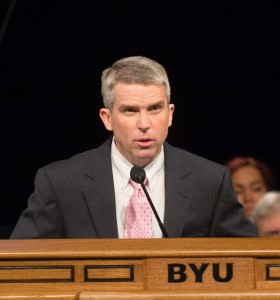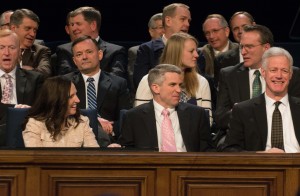
BYU Professor Scott C. Esplin addressed students on how they can overcome fear through faith in Jesus Christ at the Tuesday Jan. 19, 2016 devotional. Two of the fears he specifically spoke about concerned overcoming the fear of an unknown future and the fear of a failed past.
Esplin explained that the only way to face the fear of an unknown future is to exercise faith. He said he learned this when he read the Doctrine and Covenants one morning as he prepared to teach a class. He found that a lack of faith would deprive him of the blessings he had desired and prayed for.
“I realized if I didn’t face my fear of an uncertain future, I might never receive the blessings the Lord had in store for me,” Esplin said.
He told of an experience when he had to face his fear of an unknown future. When he was first dating his wife, Janice, he invited her to travel with him from Provo to southern Utah to spend the Thanksgiving holiday with his family. He said he began to feel scared after she accepted his invitation.
“I’d taken girls on road trips home before, and, for those familiar with Interstate-15 between Provo and southern Utah, usually by about the town of Nephi, they became the longest weekends of my life,” Esplin said.
A snowstorm delayed their return on their way back to Provo after the trip, and he said his worst fears of carrying on an extended conversation with a girl were realized.
This experience forced Esplin to face his fear of an unknown future. In doing so, Esplin said, he learned a valuable lesson.
“As you exercise faith to overcome fears of future uncertainty, you will see God’s hand in your life,” Esplin said.

Fear in one’s life, however, is not limited to the unknown future, according to Esplin. Another fear he talked about overcoming is the fear of a failed past.
“The happiness of some is crippled by fears of past failures, and the foreboding worry that the present and future can never become bright again,” Esplin said.
Esplin related the fear of a failed past to a story about one of his daughters, who was sent to the principal’s office in first grade when her actions lead to “another girl getting tapped on the head with a stick.” He said that although his daughter took the necessary measures to rectify the situation, she felt that her misbehavior on this occasion would negatively affect her future forever.
In this way, Esplin explained, past mistakes in life are sometimes used as a reminder of imperfection that prevents progression in the present.
“Even after repenting, do we ever let our past mistakes impede us from enjoying happiness now and having hope for the future?” Esplin said.
Esplin explained that in order to overcome the fear of past failure, faith must follow repentance. This faith, he said, replaces fears of the past with joy in the present and hope for the future. He said acting on this faith is what perfects us, by helping us to reach our eternal potential.
“Part of becoming like and returning to our Heavenly Father, even when we feel so imperfect in relation to Him, includes believing Him both as we repent and after,” Esplin said.
Imperfection in this life does not mean failure, according to Esplin. Faith, he explained, helps us to know that deception is in the belief that by being imperfect one is failing.
“Sometimes good people like you and my daughter become crippled by fear because focusing on past imperfections clouds the vision of how the Lord feels about you now and what your potential can be in eternity,” Esplin said.
He said both the fear of an unknown future and the fear of a failed past, classify as fears of the unknown. This fear, according to Esplin, is only overcome in developing faith by coming to know God. Esplin told of an experience when he shared this with his young daughter when she asked, “Dad, is Jesus real?”
“As I testified to her, I testify to you: God, our Father is real. His Son is real,” Esplin said. “Our faith in them will be strengthened as we learn more completely about them and have sacred experiences with them.”




